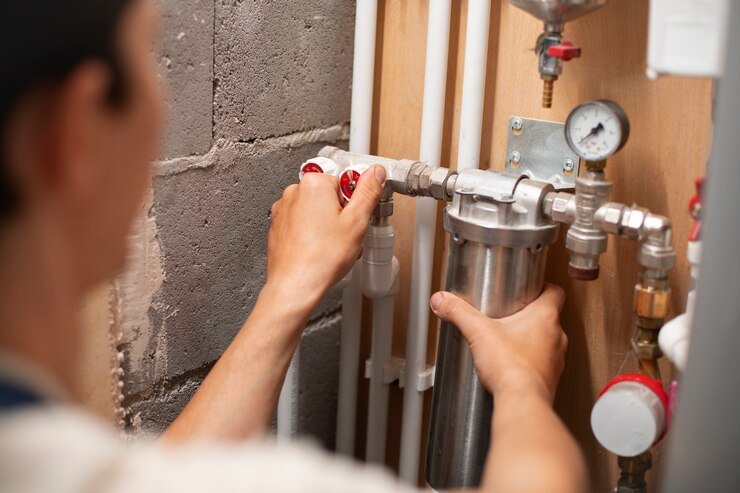A water heater is one of those essential household appliances that often goes unnoticed until it stops working. Whether it’s for a shower, washing dishes, or doing laundry, a functioning water heater is vital for comfort. But how long should your water heater last? The lifespan of your water heater depends on several factors, including the type, maintenance, and installation quality. This guide will help you understand the average lifespan of a water heater, the factors that impact its longevity, and when you should consider replacing it.
Average Lifespan of a Water Heater
The average lifespan of a water heater typically ranges from 8 to 12 years. This varies depending on the type of water heater you have:
- Tank-style water heaters: These are the most common type, and they usually last between 8 and 12 years.
- Tankless water heaters: Tankless models tend to have a longer lifespan, generally lasting up to 20 years or more if properly maintained.
- Heat pump water heaters: These tend to last 10-15 years on average.
If your water heater is approaching the end of its lifespan, it’s important to start thinking about potential replacement options. If you notice any signs of wear or failure, it’s a good idea to reach out to plumbers in Orem, UT, for professional advice and assistance.
Factors That Affect the Lifespan of a Water Heater
While the general lifespan estimates are useful, several factors can influence how long your water heater lasts. These include:
1. Water Quality
Hard water, which contains high levels of minerals like calcium and magnesium, can shorten the life of your water heater. These minerals can accumulate inside the tank, causing sediment buildup. Over time, this can reduce the efficiency of the water heater and potentially lead to a breakdown. If you live in an area with hard water, installing a water softener can help extend the life of your water heater.
2. Maintenance and Care
Regular maintenance is essential for ensuring your water heater performs optimally. Flushing the tank annually to remove sediment buildup, inspecting the anode rod (which prevents rust), and checking for leaks can all help extend its life. Neglecting maintenance can lead to decreased efficiency and a higher likelihood of breakdowns.
3. Installation Quality
The way your water heater is installed plays a significant role in its longevity. A poorly installed water heater is more likely to experience issues early on, such as leaks or inefficient heating. To ensure a long lifespan, always hire a licensed and experienced plumber to install your water heater. For residents in the Orem area, consider reaching out to plumbers in Orem, UT, to ensure proper installation.
4. Usage Patterns
How often you use your water heater also impacts its lifespan. If your household uses a lot of hot water or if you have a large family, your water heater may wear out more quickly. Additionally, if you constantly run the water heater at high temperatures, this can put additional strain on the unit. Consider lowering the thermostat to around 120°F to extend its lifespan and reduce energy costs.
5. Age of the Unit
As your water heater ages, its efficiency naturally declines. Parts wear out over time, and the materials inside the tank may begin to corrode. If your water heater is more than 10 years old, it’s a good idea to have it inspected regularly by professionals, such as plumbers in Orem, UT, to catch potential issues early.
Signs Your Water Heater Is Nearing the End
Knowing when your water heater is nearing the end of its life can save you from unexpected cold showers and water damage. Here are a few signs to watch for:
1. Water Leaks
If you notice water pooling around the base of your water heater, it could be a sign that the tank is leaking. Leaks are often a result of corrosion inside the tank, and once the tank starts to leak, it’s usually time to replace the unit.
2. Rusty or Cloudy Water
Rusty water coming from your taps, especially when you first turn on the hot water, can indicate that the inside of the tank is corroding. This is a sign that the anode rod, which protects the tank from rust, may need to be replaced. If the water remains rusty or cloudy, it could mean the tank is deteriorating and a replacement is necessary.
3. Strange Noises
If your water heater starts making popping, cracking, or rumbling noises, it could be a sign of sediment buildup inside the tank. This can cause the heating element to work harder and wear out more quickly. If the noise persists even after flushing the tank, the heater might need replacing.
4. Inconsistent Water Temperature
If your water heater is failing to maintain a consistent temperature, it may be a sign of a malfunctioning thermostat or heating element. In some cases, replacing these parts can extend the lifespan of the water heater. However, if the issue continues, it may be time for a new unit.
When Should You Replace Your Water Heater?
If your water heater is approaching 10 years old, it’s a good idea to start thinking about a replacement. If you’re experiencing any of the signs mentioned above, it’s time to call in the professionals. Plumbers in Orem, UT, can inspect your water heater and help you determine whether a repair will suffice or if it’s time to invest in a new one.
FAQs
1. Can I extend the life of my water heater?
Yes, regular maintenance, such as flushing the tank, inspecting the anode rod, and checking for leaks, can help extend the life of your water heater. Additionally, using a water softener if you have hard water can reduce sediment buildup and prolong the lifespan.
2. How do I know if my water heater is repairable or needs replacing?
If your water heater is over 10 years old and experiencing significant issues like leaks, rusty water, or strange noises, it’s often more cost-effective to replace it. A professional plumber can evaluate the unit and recommend the best course of action.
Conclusion
In conclusion, your water heater should last around 8-12 years, depending on various factors. Regular maintenance and good water quality can extend its lifespan, but if your unit is nearing the end, it’s essential to know when it’s time to replace it. If you need assistance, don’t hesitate to call plumbers in Orem, UT, to ensure your water heater is functioning properly and efficiently.



